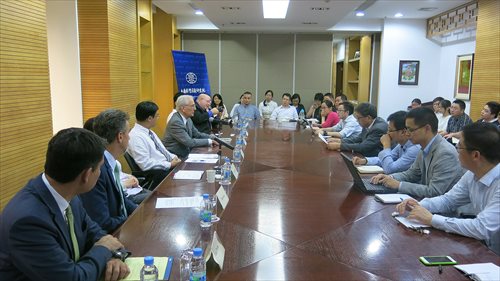Elections and the future of US-China relations
International scholars in Shanghai debate the 2016 presidential campaign
The next US presidential elections will be taking place in November 2016. Who will replace outgoing incumbent president Barack Obama? Will Hillary Clinton finally rise to her singular aspirations? Or will a Republican retake control of the White House, and if so, what foreign policy with China will he or she advocate?
Despite the elections being a year and an ocean away, these questions and others were recently debated right here in Shanghai at a public forum attended by international relations scholars from the Shanghai Institutes for International Studies (SIIS) and the Baker Institute for Public Policy (BIPP) of the US's Rice University.
"Between now and the 2016 elections, many events will occur that we cannot foresee," said Allen Matusow, associate director of the academic affairs at the BIPP, during the US Presidential Election and Future of US-China Relations forum. "Nonetheless, I believe that foreign policy will be a very important part of the campaign."
Matusow believes that two issues in particular will dominate presidential candidates' stump speeches throughout the 2015-16 election season: the Middle East and China.
"China is a rising power, and not surprisingly it resists American domination in the Western Pacific," he said. "It attempts to extend its influence in a region where the US has dominated, and that might be a kind of zero-sum game. Chinese have been successful in expanding their influence in this region while American power has diminished. And that is a source of conflict."
But, Matusow added, there are also elements of cooperation. "Clearly our economies are interdependent, and we have a lot of common interests based on global problems. To accommodate the conflicts in the Western Pacific, the US would have to rebalance its power in this region, accept the expansion of Chinese influence and accommodate China's security needs. At the same time, the Chinese must understand that we have our own interests in this region, particularly in Japan and the Philippines."
Shao Yuqun, director of the SIIS's Center for American Studies, expressed her concerns about the future of Sino-US relations.
"In general, the whole atmosphere is not very good," Shao said. "There are two main questions we should think about. For the US, whether it can really respect the Chinese path of development, its ideology and political system? And for China, whether it has thought clearly about its relationship with the US security alliance in the Asia-Pacific region? So far I don't think either of the two sides is prepared to answer these questions."
As for the elections, Shao agreed with Matusow that foreign policy will be a very important part of their campaigns. "The Middle East will be the number one issue. I don't know whether China will be the second issue - I hope not - but undoubtedly China will be one of the major topics during debates among candidates, especially when they touch upon trade and economic issues."
Noting that Tsai Ing-wen, chairperson of the Democratic Progressive Party of Taiwan and a popular candidate for the 2016 Taiwan leadership election, visited the US in June, Shao believed that Taiwan will also be brought up when candidates are discussing US policies toward China.
"In general, no matter who will be the next US president, I think that US policy toward China will become tougher," she said.

Scholars at the forum on US Presidential Election and the Future of Sino-US Relations Photo: Courtesy of Shanghai Institutes for International Studies